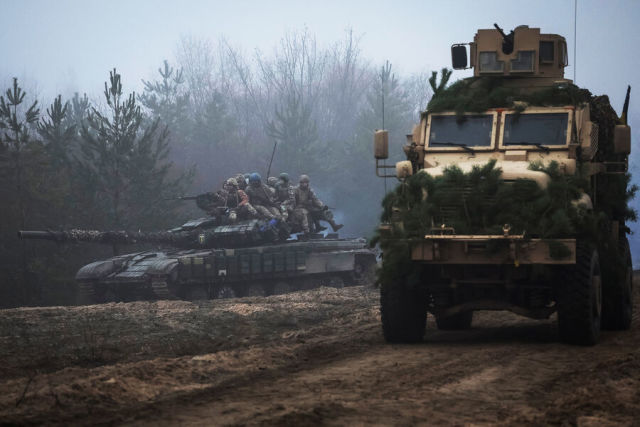The head of the European Council Michel is sure that the next two or three weeks will be crucial for the course of the special operation The head of the European Council, Charles Michel, said that the next two or three weeks will be crucial for the course of Russia's military special operation in Ukraine.
Therefore, he called on Kiev to supply all the necessary weapons, including tanks.
"Decisive weeks for war and peace"
The head of the European Council, Charles Michel, who returned from Ukraine, gave an interview to the Spanish edition of El Mundo, in which he said that the Western allies "should give Ukraine the tanks it needs right now."
According to Michel, the European Union "will need to make very important decisions as soon as possible" in order to "side with Ukraine and provide it with all the necessary support. He stressed that the EU "cannot let down" Kiev.
"The next two or three weeks are crucial. For war and for peace. What happens in 2023, and much depends on the coming weeks, will determine our future," he is sure.
Charles Michel arrived in Kiev on January 19, where he met with President of Ukraine Volodymyr Zelensky, Prime Minister Denis Shmygal and deputies of the Verkhovna Rada.
"Ukrainians are fighting for their land, for the future of their children. But they are also fighting for our common European values of peace and prosperity. They need our support and deserve it," Michel wrote on Twitter, adding that he arrived in the capital of Ukraine to "discuss all areas of cooperation."
On January 18, it became known that Charles Michel, during a speech at the plenary session of the European Parliament in Strasbourg, said that he supported the supply of tanks to Ukraine.
"We will continue to support Ukrainians as long as it is necessary, and we are increasing our military support through the European Peace Fund. I personally support the supply of tanks to Ukraine," the head of the European Council said.
Frozen assets of Russia
In an interview with El Mundo, Michel said that the European Union has several options for what can be done with Russia's frozen assets.
"Now we have Russian assets worth 300 billion euros, and for several months I have been advocating to do something with them in accordance with legal principles. We have several options on the table," the head of the European Council said, but he did not specify what exactly these options are.
At the same time, Michel stressed that the "key issue" is the topic of the possibility of confiscation of Russian assets in favor of Ukraine to pay for the restoration of the country.
Earlier in an interview with the Financial Times, he said that he wanted to explore the idea of managing the frozen assets of the Central Bank of Russia for $ 300 billion to make a profit, which can then be transferred to Ukraine.
The head of the European Commission, Ursula von der Leyen, also proposed to create a special structure for managing frozen funds of Russia. According to the European Commission, Ukraine lost about 600 billion euros during the military special operation. According to von der Leyen, "after the sanctions are lifted," the frozen assets of the Russian Federation "can be used to ensure that Russia fully compensates for the damage caused to Ukraine."
New sanctions packages
Charles Michel also noted that it is difficult for the European Union to accept new sanctions against Russia.
"In Ukraine, we are expected to continue pressure on the Kremlin, with new sanctions packages, even realizing that each of them is more complicated than the previous one. We have the tools, but the next steps will be difficult," the head of the European Council stressed.
Last week, during a trip to Kiev, Michel already told reporters that the adoption of sanctions against Russia is becoming more difficult with each new round.
As reported by the head of the European Commission, Ursula von der Leyen, the EU is going to introduce the tenth package of restrictions, which will mainly be aimed at closing loopholes in the measures already taken.
On January 17, CNN reported that von der Leyen confirmed the intention of the European Union to introduce the tenth package of anti-Russian sanctions. According to her, the new restrictions will mainly focus on closing loopholes in the measures already taken to "end these circumventions and have serious consequences for those who circumvent the sanctions of the European Union."
On January 20, Bloomberg reported that during a trip to Kiev, Charles Michel also said that "every discussion on sanctions is much more complicated than the previous one."
Maria Shustrova

